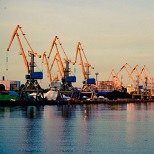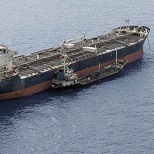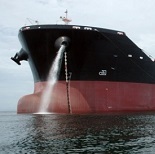Vessel arrest and detention in Georgia. Part 2
The meaning of sea vessel arrest as the maritime law institute was implemented in the legal framework of Georgia when the Maritime Code of Georgia (No.715-IIС dd. 15.05.1997) entered into force. The present institute remained neglected till that moment. Like other ex-USSR countries, in the first years of independence Georgia complied with so-called Doctrine of arrest ineligibility in respect of vessels sailing under the flag of other state. It was deemed as offence against sovereignty of the flag state. The present institute as legal instrument in civil circulation was neglected and it has done a disservice to those ex-UUSR countries which used to have their own fleet and lost their expensive motor vessels due to effective arrests for the purpose of obtaining creditors’ maritime claims. Such countries certainly include Ukraine and Georgia.
The institute of vessel arrest appeared in the legal framework of Georgia when there were implemented different forms of ownership on sea transport and, first of all, private ship owners registered under the flag of Georgia. It was certainly caused by entering of the new Civil Procedural Code of Georgia (No.1106- 1С dd. 14.11.1997) into force and by first stage of performing the court reform in whole. As the result the system of justice was deprived of state arbitrations and it was represented by general courts of three instances performing civil, administrative and criminal proceedings. As the result, the procedural form of vessel arrest was created.
The problem of vessel arrest in the Georgian judicial practice is facing essential changes now. International acts and domestic judicial practice cause attempts to make unified standards for settling the issues of vessel arrest in the legal framework of Georgia.
Unfortunately, judicial practice is still controversial and ambiguous. It is caused, first of all, by gaps in legislation and small work experience of judges. Here we will study theoretical and practical aspects of efficient use of the vessel arrest institute within jurisdiction of Georgia.
General provisions
Article 831 of the Maritime Code of Georgia states, ‘Vessel arrest shall be performed in order to secure a maritime claim only. Maritime claim shall be based on vessel ownership and other property relations arisen in vessel construction, management, operation, commercial use, vessel mortgage or salvage’.
Vessel arrest and release shall be performed only by the court in compliance with the Civil Procedural Code of Georgia.
Unfortunately, all domestic acts of legislation of Georgia which govern maritime industry have no other law regulations of vessel arrest or definition of the sea vessel arrest in fact. Georgia is the member of neither the International Convention Relating to the Arrest of Sea-Going Ships (Brussels, 10.05.1952), nor the International Convention on the Arrest of Ships (Geneva, 12.03.1999). Therefore in performing vessel arrest both the present regulations and judicial practice of Georgia are deemed as the source of law (both substantive and procedural one to some extent).
Let us study the peculiarities of applying the present institute in Georgia.
Competence of the court which performs arrest
According to the general rule provided by Article 831 of the Maritime Code of Georgia, general court is the only body empowered to consider vessel arrest and release in the legal framework of Georgia. The procedure of arrest and release shall be performed in compliance with the Civil Procedural Code of Georgia. Taking into account structure and regulations of the Civil Procedural Code, we may state unambiguously that vessel arrest can be performed as claim security only (as maritime claim in our case).
In cases of arrest of the vessel sailing under the flag of Georgia, irrespective whether is stays within or beyond the territorial sea of Georgia, the regulation is imperative anyway. The problems arise in case of arrest of the foreign vessel within jurisdiction of Georgia. In order to assess the opportunities of arrest of such vessel by general courts of Georgia let us study the present issue in the following way.
Like other civil law countries Georgia has the standard rule of case consideration with a foreign element. In particular, the court shall:
- determine court jurisdiction in respect of the claim/application being considered;
- determine qualification and nature of the claim subject to settlement.
Therefore, in case of claim consideration on vessel arrest, there shall prevail justification of competence of the Georgian court which considers a certain claim.
In such cases general competence is usually grounded by the main international act of maritime law, the United Nations Convention on the Law of the Sea dd. 1982 (Georgia has been Party to this Convention since 09.09.1995). Article 28 “Civil jurisdiction in relation to foreign ships” states that the coastal State may not levy execution or arrest the foreign ship passing through the territorial sea for the purpose of any civil proceedings, save only in respect of obligations or liabilities assumed or incurred by the ship itself in the course or for the purpose of its voyage through the waters of the coastal State. This provision does not touch the right of the coastal State to levy execution or arrest the foreign ship anchored in the territorial sea or passing through the territorial sea after leaving the internal waters for the purpose of civil proceedings.
Other international act which regulates jurisdiction of application on vessel arrest for general courts of Georgia is he United Nations Convention on the Carriage of Goods by Sea dd. 1978 (Hamburg Rules; Georgia has been Party to this Convention since 09.09.1995). Due to limitations of regulations of the present Convention in respect of private law, its provisions are recommended to be applied in order to justify court jurisdiction in cases of disputes arisen from cargo transportation by sea. Here we should mention two particular items of this Convention in determining court jurisdiction in the present issue:
1. In case of performing arrest, applicable rules of the law of the Contracting State shall prevail.
2. Provisions on place of commencement of court proceeding under this Convention do not constitute an obstacle to the Jurisdiction of the Contracting States for provisional or protective measures.
Having generalized the present provisions and practice of applying thereof by courts of Georgia we should sate that in such cases the courts of Georgia shall perform vessel arrest only when the corresponding court is competent for case consideration in fact.
Let us study domestic regulations of court competence. The main regulation is provided by the Law of Georgia on Maritime Spaces (No.1756 dd. 24.12.1998). In particular, Article 26 states that it is possible to take enforcement measures regarding the foreign ships passing through the territorial sea, having left the internal waters of Georgia, or staying in the territorial sea of Georgia for the purpose of civil claim security.
General court is the only body empowered to secure civil claim within the jurisdiction of Georgia including the territorial sea thereof. But application of the present provision may be expanded due to the fact that it does not define directly a certain court empowered thereto. Therefore such provision may justify not only jurisdiction of the first instance court having its authorities within the territory of vessel location, but also jurisdiction of the appeal court empowered to take security measures upon the dispute settled at arbitration courts, as well as jurisdiction of the cassation court in the procedure of recognition and enforcement of court decision or arbitration award of the foreign state (international arbitration) if the vessel is within jurisdiction of Georgia. It is noteworthy that we already have practice of justifying court jurisdiction in Georgia.
The next important standards of justifying competence of Georgian courts are provided by the Law of Georgia on Private International Law (No.1362- IIс dd. 29.04.1998). As compared to the Maritime Code or the Law on Maritime Spaces, this law is one of the most applicable at courts.
General provisions of the present Law regarding competence of the courts of Georgia state that:
- general courts of Georgia have special international competence in applications on enforcement measures taken or required for taking in Georgia;
- the court of Georgia is deemed as competent if security measures are enforceable in Georgia or the courts of Georgia have international competence.
We should also state that application on vessel arrest may be taken into consideration as private law claim security measure taken by courts of Georgia in two cases:
- if the court of Georgia has international competence;
- if claim security measures are enforceable.
© A. Nitsevych, 2013
Partner, Attorney-at-law
Head of the Nautical Institute of Ukraine, MNI
Interlegal
Ukraine, Kiev – Odessa
© P. Kopaleishvili, 2013
p.kopaleishvili@arbitration.com.ge
Managing partner
Marine Legal Adviser, Georgia
Specialy for "Transport" magazine
(1).png)
Cargo transportation by sea is one of the most reliable and most expensive methods of goods delivery worldwide. Sea lines are one of...

A NEW INITIATIVE BY THE MINISTRY OF TRANSPORT AND INFRASTRUCTURE The new regulation that entered into force in 28 April 2021 has impo...

Dear colleagues, Here is Quarterly Shipping newsletter broght to you by Interlegal. Let us present the most valuable cases and n...

The issue of the port and berth safety is among those which raise various disputes between the interested parties. As the reasons for declar...

Although travel restrictions are beginning to ease, there are still restrictions in many countries impacting on crew changes. The new clause...
 Ship arrest in Ukraine: new approaches2020.06.18
Ship arrest in Ukraine: new approaches2020.06.18The concept of one shipowner – one vessel The concept of one shipowner – one vessel arose due to shipowners’ reasonable desire to secure...

Task The Client – large bunkering company making business in Black Sea Region – applied to Interlegal for debt recovery for bunker supply...

Dear Interlegal clients, Please be informed that in the third quarter of the 2019 year significant changes of Ukrainian legisla...

A presidential decree has been published in the official gazette on 03.05.2019 marking the date on which the 1999 Convention officially beca...
 LMAA arbitration notice clause2019.02.27
LMAA arbitration notice clause2019.02.27The LMAA has published a clause for use in arbitration agreements to facilitate effective notice by email (including for commencement of arb...




 Odessa, 65014, Ukraine, 1 а, Gretska St
Odessa, 65014, Ukraine, 1 а, Gretska St
